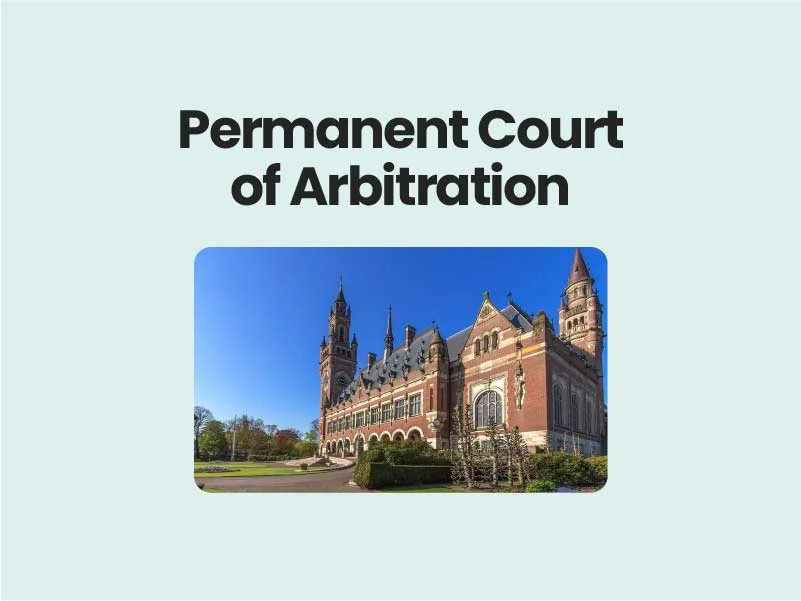
Permanent Court of Arbitration (PCA)
The Permanent Court of Arbitration (PCA) is not a court, but rather an organizer of arbitral tribunals to resolve conflicts between member states, international organizations, or private parties. Established in 1899 to facilitate arbitration and other forms of dispute resolution between states, the PCA has developed into a modern, multi-faceted arbitral institution perfectly situated to meet the evolving dispute resolution needs of the international community.
Significance of Permanent Court of Arbitration :
- Among the aims of the Conference had been the strengthening of systems of international dispute resolution—especially international arbitration.
- The delegates at the Conference were mindful that, during the previous 100 years, there had been a number of successful international arbitrations, starting with the “Jay Treaty” Mixed Commissions at the end of the 18th century, and reaching a pinnacle with the Alabama arbitration in 1871-1872.
- In addition, the Institut de Droit International had adopted a code of procedure for arbitration in 1875.
- This movement toward arbitration as a means of international dispute resolution was continued in 1899, and the most concrete achievement of the 1899 Conference was the establishment of the PCA as the first global mechanism for the settlement of disputes between states.
- Article 16 of the 1899 Convention recognized that “in questions of a legal nature, and especially in the interpretation or application of International Conventions” arbitration is the “most effective, and at the same time the most equitable, means of settling disputes which diplomacy has failed to settle”.
- Accordingly, Article 20 of the 1899 Convention formally established the PCA, stating:
- With the object of facilitating an immediate recourse to arbitration for international differences which it has not been possible to settle by diplomacy, the signatory Powers undertake to organize a Permanent Court of Arbitration, accessible at all times and operating, unless otherwise stipulated by the parties, in accordance with the rules of procedure inserted in the present Convention.
- The 1899 Convention was revised at the second Hague Peace Conference in 1907.
- Today the PCA provides services for the resolution of disputes involving various combinations of states, state entities, intergovernmental organizations, and private parties.
Three-part organizational structure:
- Administrative Council — oversees its policies and budgets, a Members of the Court — panel of independent potential arbitrators
- International Bureau — Secretariat headed by the Secretary-General.
India-PCA:
- India is a party of the PCA according to the Hague Convention on 1899.
- It has ruled against the Indian government over the cancellation of a contract between telecommunications firm Devas Multimedia and Antrix Corporation Ltd., in a decision that could cost the Centre billions of dollars in damages.: In 2005, the Indian Space Research Organisation’s (ISRO) commercial arm Antrix Corporation entered into an agreement with Devas to lease out satellite spectrum which the Bangalore-based company could use to provide high-quality telephony and Internet services.
- The Italian marines were accused of killing two Indian fishermen :Two Italian marines — Massimiliano Latorre and Mr. Girone are facing the charge of murdering 2 Indian fishermen in 2012 off the Kerala coast. The fishermen were killed when the marines on duty aboard MV Enrica Lexie, an Italian-flagged oil tanker, fired at them. The order is binding for both countries as there is no appeal process in the UN tribunal.
- The Permanent Court of Arbitration at The Hague has maintained that the Cairn tax issue is not a tax dispute but a tax-related investment dispute and, hence, it falls under its jurisdiction.
- India’s demand in past taxes, it said, was in breach of fair treatment under the UK-India Bilateral Investment Treaty.
- The tribunal ordered the government to return the value of shares it had sold, dividends seized and tax refunds withheld to recover the tax demand.
- The government was asked to compensate Cairn “for the total harm suffered” together with interest and cost of arbitration.
Enroll today with the best civils service academy and take your first step towards your Civils journey.
Feel free to reach out to us for any inquiries, collaborations, or support. We’re here to help.

